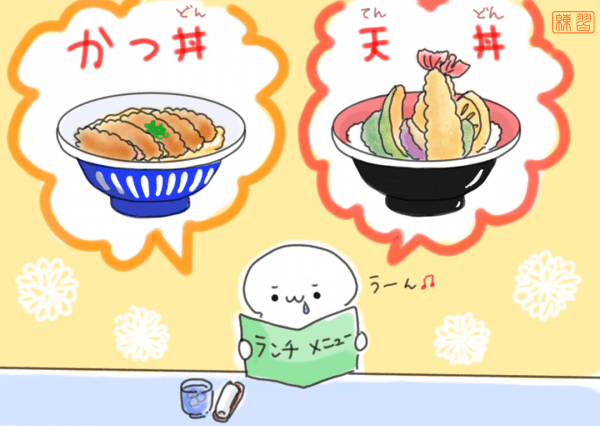To make A; To change into A.
This displays the changing of the state or condition of something. The change is done by the subject.
- To make A; To change into A. This displays the changing of the state or condition of something. The change is done by the subject.
- To choose A (when ordering/choosing)
44
水泳は足を強く為る。
Swimming makes your legs strong.
0
27
其の少年は大人を馬鹿にする。
The boy makes a fool of adults.
0
41
君は僕を幸せに為る。
You make me happy.
0
6
エアコンを強く為て下さい。
Please turn up the air conditioner.
0
8
御楽に為て下さい。
Make yourself at home.
0
2
御年寄りには親切に為なさい。
Be kind to old people.
0
10
此の手紙を書留に為て貰いたい。
I want this letter registered.
0
16
此の文を英文に為なさい。
Put this sentence into English.
0
3
ダブルベッドの部屋に為て下さい。
Please make it a room with a double bed.
0
21
出来るだけ辛く為て下さい。
Make it as (spicy) hot as you can.
0
5
ラジオの音を低く為て下さい。
Please turn down the radio.
0
1
私が話して居る間は静かに為て居なさい。
Be quiet while I'm speaking.
0
10
速達に為て呉れませんか。
Can you make it special delivery?
0
9
サンドイッチは三角に為てね。
Cut the sandwich into triangles, ok?
0
Getting the sentences
Construction
(Elements in parentheses are optional.)
Basic Examples:
看板娘に為る (make someone into a Poster Girl)
Basic Examples:
奇麗に為る (to make pretty, clean)
良くする (to make better)
Where this grammar is found
Grammar usage notes
Nothing posted yet!
Questions/Discussion
Is ~にする and ~くする for adjectives similar to 'be (adj.)' in English? Like 静かにする, it might translate to 'be quiet', or 強くする, which might translate to 'be strong', stuff like that. (Sorry if this was already asked, I didn't really dig into the discussions about the grammar)
Yes. 静かにする would be to make it quiet. The latter would be to make it strong(er). This is an active process you are involved in vs なる which can be a passive process.
Thank you for explaining! It's very helpful ^^
To choose A (when ordering/choosing)
- To make A; To change into A. This displays the changing of the state or condition of something. The change is done by the subject.
- To choose A (when ordering/choosing)

何方に為ますか?
Which will you have?
32
此の部屋の色を赤に為よう!
Let's make this room red!
3
17
私はコーラに為ます!
I'll have a cola (soft-drink)!
0
25
僕はもう注文したけど、貴方は何に為る?
I already ordered, but what are you going to get?
0
26
未だ決まって居ない?じゃ、伊太利レストランに為ようか?
You still haven't decided? Well then, why don't we go to an Italian restaurant?
0
27
珈琲はどんな風に為ましょうか。濃いブラックがいいですか。
How do you like your coffee? Strong and black?
0
18
御昼ご飯は拉麺に為る。
I'll have ramen for lunch.
0
11
今度の旅行先は、京都と大阪に為ました。
I've decided on Kyoto and Osaka as our next destinations.
0
18
伯母さんへのお土産は何れに為ようかな。
I wonder which souvenir I should pick for my aunt.
0
12
明日の待ち合わせ場所は駅の改札前に為ましょう。
For the meeting place tomorrow, let's make it in front of the ticket gate at the station.
0
9
牛肉に為て下さい。
Beef please.
0
4
今日は入浴為ず、シャワーだけに為るわ。
Today I'm going to skip the bath and just take a shower.
0
Getting the sentences
Construction
(Elements in parentheses are optional.)
Basic Examples:
咖哩に為る (to choose curry, (I'll have) curry)
Where this grammar is found
Grammar usage notes
Nothing posted yet!
Questions/Discussion
Nothing posted yet!